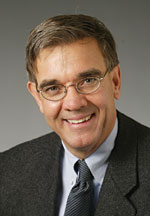Vital Signs
CLINICAL OBSERVATION
In this section, we highlight the human side of clinical academic medicine, putting a few questions to a physician at DMS-DHMC.
Andrew Torkelson, M.D.
Assistant Professor of Medicine (Cardiology)
Torkelson joined the Dartmouth faculty in 1985, after completing his residency and a fellowship at DHMC. He practices general cardiology and has a special interest in cardiac rehabilitation, cardiac stress-testing, and cardiac catheterization.
Who was your medical mentor?
One of my mentors was George Engle, one of the first psychiatrist-internist physicians and a master at the interviewing technique. He was at the University of Rochester and did his undergraduate work here at Dartmouth. He taught me the psychosocial model of medicine and has been influential in my understanding of patients and patient care.
What famous doctor, living or dead, would you most like to spend a day shadowing?
It would probably be George Hoyt Whipple. Dr. Whipple was the founding dean of Rochester Medical School, which I attended. Biographies written about him describe him as a man at the cutting edge of both the scientific field of medicine and the techniques of teaching medical students and as a Renaissance man who enjoyed fly-fishing, reading, and outdoor activities.
Of what professional accomplishment are you most proud and why?
The professional accomplishment that I am most proud of is something that occurs every day for me—specifically, when I connect with patients and help them make decisions that, based on my best understanding, will improve the quality and hopefully the quantity of their lives.
If you weren't a physician, what would you like to be?
I'm not sure what I would be. My brother was a professional football player, and I always wanted to be like him. His career in professional football with the Green Bay Packers spanned eight years, and he is now successful in business. Probably my vicarious enjoyment of his career has substituted for what I might like to have been.
If you could travel anywhere, where would you choose to go and why?
If I could choose anywhere at this point to travel, it would be to St. Petersburg, Russia. The art and history there are fascinating to me.
What was the last book you read and what book do you keep meaning to read?
I read one book per week. My most recent was Reading Lolita in Tehran by Azar Nafisi. This is about the oppression of women in Iran and how they used literature to escape from this oppression. I am currently reading Empire Express, which is a history of the transcontinental railroad. A book I keep meaning to read is Ulysses, but I can never get through the first 20 pages.
What was the last movie you saw?
Seabiscuit. The book was better than the movie.
 What advice would you offer to someone who is contemplating
going into your field?
What advice would you offer to someone who is contemplating
going into your field?
I would never discourage anyone from going into medicine but would simply remind them that the most difficult aspect of it is the duration of time required to reach your ultimate goal. But it can be done, as long as an individual is able to find the time to pursue other life activities— such as love of other individuals, literature, or athletics.
I view achieving this balance between personal and professional life goals as my greatest success, having been married for 27 years and having two children—a daughter at Williams and a daughter at Middlebury.
It's hard for an individual to know where their life will end up going. If they feel they can pull off this balance in their life, no matter what their profession, they should go for it!
